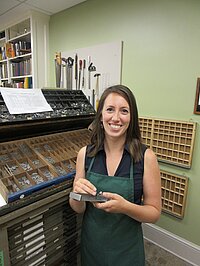Dr. Amy Gore

Dr. Amy Gore
Assistant Professor of English
Ph.D. English Language and Literature (University of New Mexico, 2019)
Office: Minard 318E42
Contact:amy.gore@ndsu.edu
Research/Teaching: Early and Nineteenth-Century American literature, Indigenous literature, book history and print culture, Gothic literature, body studies, and the recovery of marginalized women and Native American writers
Amy Gore’s scholarship and teaching specializes in nineteenth-century Indigenous and American literatures, with interests in book history, gothic literature, body studies, and the recovery of nineteenth-century women and Native American writers. She received her doctoral degree at the University of New Mexico, and she also holds an M.A. in Native American Studies from Montana State University, an M.A. in English from the Bread Loaf School of English, Middlebury College, and a B.A. in English from Eastern University, PA.
Her first book, Book Anatomy: Body Politics and Materiality in Indigenous Book History (University of Massachusetts Press, 2023) theorizes the material relationships between books and bodies in nineteenth-century Indigenous literary history to claim the book itself as a form of embodied power relations. She is at work on a second book project, co-edited with Dan Radus and titled Gatherings: New Directions in Indigenous Book History, and a third book project on the literary of nineteenth-century woman writer Ann S. Stephens. She has recent or forthcoming work in a number of edited collections as well as Pedagogy, Western American Literature, and Studies in American Indian Literature.
Her research, teaching, and mentoring have received multiple awards, including a National Endowment for the Humanities Summer Stipend, the Center for Regional Studies Hector Torres Fellowship, the Emerging Scholars Professional Development Fellowship from the Association for the Study of American Indian Literatures (ASAIL), and the Vogel Award in Teaching Excellence. She has been inducted into the Andrew W. Mellon Society of Fellows in Critical Bibliography, in which she is now a Senior Fellow, and she has been invited to give public lectures by the American Antiquarian Society, the Grolier Club, and the Book Club of California. She also enjoys volunteering her time by giving museum tours at the Indian Pueblo Cultural Center, demonstrating historical printing on antique letterpress machines at Bonanzaville and the Braddock News Letterpress Museum, and taking on leadership roles in animal rescue at 4 Luv of Dog.
What made you want to work in English Studies?
As an undergraduate, I was drawn to how encompassing an English degree could be—I could study history, psychology, women and gender studies, language, and ethnic studies all as a vital part to how we study literature. All my interests could be combined in one degree without having multiple majors.
What do you like about working with students?
The energy! I love incorporating hands-on activities in my classroom, from bringing students to see historical documents in the archives to bringing in an 1803 almanac and 1950s magazines into our class. I get excited to share primary sources, and the enthusiasm I see from students in return keeps me energized after fifteen years of college teaching.
Three book recommendations:
The books I love are always changing, and I believe that certain books can resonate with us at different times in our lives. So my book recommendations are 1) read what you love 2) read widely—try new authors and new genres and 3) support libraries, used bookstores, and independent booksellers
Recent publications (not the full list, see CV)
Book Anatomy: Body Politics and Materiality in Indigenous Book History. Amherst: University of Massachusetts Press, 2023.
“Teaching Indigenous and Multi-Ethnic Literature Through Book History.” In Teaching the History of the Book, edited by Emily Todd and Matteo Pangallo. Amherst: University of Massachusetts Press, 2023.
“Embodied Learning in a Digital Age: Collaborative Undergraduate Instruction in Material Archives.” Co-authored with Glenn Koelling. Pedagogy: Critical Approaches to Teaching Literature, Language, Composition, and Culture 20, no. 3 (2020): 453-472.
“Pretty Shield’s Thumbprint: Body Politics in Paratextual Territory.” Western American Literature 55, no. 2 (2020): 167-192.
“Gothic Silence: S. Alice Callahan’s Wynema, the Battle of the Little Bighorn, and the Indigenous Unspeakable.” Studies in American Indian Literatures 30, no. 1 (2018): 24-49.


